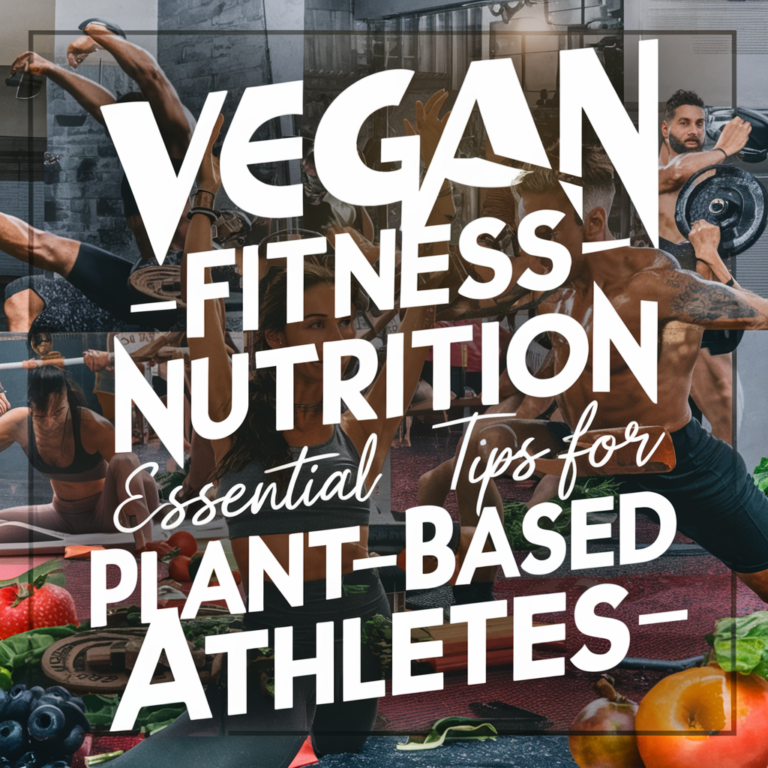Table of Contents
Introduction
The world of sports and fitness is witnessing a growing trend towards plant-based diets, with an increasing number of athletes embracing veganism. This shift is not just a lifestyle choice but a strategic decision to enhance performance and overall health. Vegan diets, rich in fruits, vegetables, whole grains, and legumes, offer numerous benefits including improved recovery times, reduced inflammation, and better long-term health outcomes.
Did you know? Elite athletes like Venus Williams, Lewis Hamilton, and Novak Djokovic have attributed their success in part to their plant-based diets.
Vegan Fitness Nutrition
This article aims to provide essential nutritional tips for vegan athletes to optimize their performance and health. Whether you’re a professional athlete or a fitness enthusiast, understanding how to fuel your body with plant-based foods is crucial for achieving your athletic goals while maintaining a vegan lifestyle.
Understanding Nutritional Needs of Vegan Athletes
Macronutrient Requirements
Vegan athletes need to pay special attention to their macronutrient intake to ensure optimal performance and recovery:
- Carbohydrates: The primary energy source for high-intensity activities. Aim for 5-7 g per kg of body weight daily.
- Proteins: Essential for muscle repair and growth. Target 1.2-2.0 g per kg of body weight daily.
- Fats: Important for hormone production and nutrient absorption. Should comprise 20-30% of total calorie intake.
Micronutrient Considerations
Vegan diets can be rich in many micronutrients, but some require special attention:
- Vitamin B12: Critical for nerve function and DNA synthesis. Supplementation is often necessary.
- Iron: Essential for oxygen transport. Plant-based sources are less bioavailable, so intake should be higher.
- Calcium: Crucial for bone health and muscle function. Fortified plant milks and leafy greens are good sources.
- Zinc: Important for immune function and protein synthesis. Found in legumes, nuts, and seeds.
- Vitamin D: Necessary for calcium absorption and immune function. Sunlight exposure or supplementation is often needed.
Pro Tip:
Track your nutrient intake using a food diary app to ensure you’re meeting your macro and micronutrient needs. This can help identify any potential deficiencies in your vegan diet.
Meeting Protein Needs
Sources of Plant-Based Protein
Contrary to popular belief, vegan athletes can easily meet their protein needs through plant-based sources:
| Food | Protein Content (per 100g) |
|---|---|
| Tempeh | 20g |
| Lentils | 9g |
| Quinoa | 4g |
| Almonds | 21g |
| Tofu | 8g |
Supplementation Options
For athletes with higher protein needs or those struggling to meet requirements through whole foods, plant-based protein supplements can be beneficial:
- Pea Protein: High in branched-chain amino acids (BCAAs), crucial for muscle recovery.
- Rice Protein: Easily digestible and hypoallergenic.
- Hemp Protein: Contains all essential amino acids and is rich in omega-3 fatty acids.
Pro Tip:
Combine different plant protein sources throughout the day to ensure you’re getting all essential amino acids. For example, pair rice with beans or quinoa with lentils.
Ensuring Sufficient Energy Intake
Caloric Density of Plant Foods
Vegan athletes often face the challenge of meeting high energy needs due to the lower caloric density of many plant foods. Strategies to increase caloric intake include:
- Incorporating energy-dense foods like nuts, seeds, and avocados
- Using healthy oils in cooking, such as olive oil or coconut oil
- Consuming smoothies with added nut butters and plant-based protein powders
- Snacking on dried fruits and trail mixes
Meal Planning Tips
Here are some energy-dense meal ideas for vegan athletes:
- Quinoa bowl with roasted vegetables, chickpeas, and tahini dressing
- Whole grain pasta with lentil bolognese and nutritional yeast
- Sweet potato stuffed with black beans, guacamole, and vegan sour cream
- Overnight oats made with plant milk, chia seeds, and mixed berries
A balanced vegan meal for athletes: Quinoa bowl with roasted vegetables, tofu, and avocado
Managing Micronutrient Intake
Critical Nutrients for Vegan Athletes
While a well-planned vegan diet can provide most nutrients, some require special attention:
- Vitamin B12: Found primarily in animal products, supplementation is crucial for vegans. Aim for 2.4 mcg daily.
- Iron: Plant-based iron (non-heme) is less bioavailable. Consume iron-rich foods with vitamin C to enhance absorption.
- Calcium: Aim for 1000 mg daily through fortified plant milks, leafy greens, and tofu processed with calcium sulfate.
- Iodine: Can be obtained from iodized salt or seaweed. Aim for 150 mcg daily.
- Omega-3 Fatty Acids: While plant sources like flax and chia seeds provide ALA, consider algae-based supplements for EPA and DHA.
Supplement Recommendations
Consider the following supplements to fill potential nutritional gaps:
- Vitamin B12 supplement (1000-2000 mcg weekly)
- Vitamin D3 from lichen (1000-2000 IU daily, especially if limited sun exposure)
- Algae-based omega-3 supplement (200-300 mg combined EPA and DHA daily)
- Zinc (15-30 mg daily, if struggling to meet needs through diet)
Pro Tip:
Consider getting a blood test annually to check for any nutrient deficiencies and adjust your diet or supplementation accordingly.
Enhancing Athletic Performance
Role of Antioxidants and Phytochemicals
Plant-based diets are naturally rich in antioxidants and phytochemicals, which can enhance recovery and performance:
- Berries: High in anthocyanins, which may reduce muscle damage and inflammation.
- Dark Leafy Greens: Rich in nitrates, which can improve blood flow and oxygen utilization.
- Turmeric: Contains curcumin, a powerful anti-inflammatory compound.
- Tart Cherry Juice: May reduce muscle soreness and improve recovery.
Hydration and Electrolyte Balance
Proper hydration is crucial for athletic performance. Vegan athletes should:
- Drink water regularly throughout the day
- Consume electrolyte-rich foods like coconut water, bananas, and leafy greens
- Consider using plant-based electrolyte drinks during intense or prolonged exercise
Hydration Tip: Aim to drink 500-600 ml of water 2-3 hours before exercise, and 200-300 ml every 10-20 minutes during exercise.
Sample Meal Plans for Vegan Athletes
Pre- and Post-Workout Nutrition
Pre-Workout Snack Ideas:
- Banana with almond butter
- Whole grain toast with avocado
- Smoothie with plant-based protein, spinach, and berries
Post-Workout Meal Ideas:
- Tofu scramble with vegetables and whole grain toast
- Lentil and vegetable curry with brown rice
- Quinoa salad with mixed beans, vegetables, and tahini dressing
Daily Meal Plan Example
| Meal | Food Items |
|---|---|
| Breakfast | Oatmeal with chia seeds, berries, and plant-based protein powder |
| Snack | Apple slices with almond butter |
| Lunch | Chickpea and vegetable stir-fry with brown rice |
| Pre-Workout | Banana and a handful of walnuts |
| Post-Workout | Smoothie with plant milk, spinach, pineapple, and vegan protein powder |
| Dinner | Lentil pasta with tomato sauce, nutritional yeast, and mixed vegetables |
| Evening Snack | Whole grain crackers with hummus |
Pro Tip:
Adjust portion sizes and meal frequency based on your individual energy needs and training schedule. Always listen to your body and fuel it accordingly.
Conclusion
Maintaining optimal nutrition as a vegan athlete is not only possible but can be highly beneficial for performance and overall health. By focusing on a variety of whole plant foods, paying attention to key nutrients, and supplementing where necessary, vegan athletes can thrive in their chosen sports.
Remember these key points:
- Ensure adequate protein intake through a variety of plant sources
- Focus on nutrient-dense, energy-rich foods to meet caloric needs
- Pay special attention to critical nutrients like B12, iron, and omega-3s
- Stay well-hydrated and balance electrolytes
- Plan meals to support pre- and post-workout nutrition
With proper planning and attention to nutritional needs, vegan athletes can perform at their peak while adhering to their ethical and dietary choices. As the world of sports continues to embrace plant-based nutrition, we can expect to see more and more athletes thriving on vegan diets.
FAQs: Vegan Fitness Nutrition for Plant-Based Athletes
Q1: Can vegan athletes really get enough protein?
Yes, vegan athletes can absolutely get enough protein. Many plant-based foods are rich in protein, including:
Legumes (beans, lentils, peas)
Soy products (tofu, tempeh, edamame)
Seitan (wheat protein)
Quinoa
Nuts and seeds
By incorporating a variety of these foods and possibly using plant-based protein supplements, vegan athletes can easily meet their protein needs. The key is to consume a diverse range of plant proteins throughout the day to ensure you’re getting all essential amino acids.
Q2: How can vegan athletes prevent iron deficiency?
Vegan athletes can prevent iron deficiency by:
Consuming iron-rich plant foods like leafy greens, lentils, tofu, and fortified cereals
Pairing iron-rich foods with vitamin C sources to enhance absorption
Avoiding tea and coffee with meals, as they can inhibit iron absorption
Considering iron supplementation if recommended by a healthcare provider
Regular blood tests can help monitor iron levels and prevent deficiency.
Q3: Is B12 supplementation necessary for vegan athletes?
Yes, B12 supplementation is generally necessary for all vegans, including athletes. Vitamin B12 is found almost exclusively in animal products, so vegans need to obtain it from fortified foods or supplements. For athletes, adequate B12 is crucial for energy production, red blood cell formation, and nervous system function.
Q4: How can vegan athletes ensure they’re getting enough calories?
Vegan athletes can ensure adequate calorie intake by:
Incorporating calorie-dense foods like nuts, seeds, avocados, and whole grains
Increasing meal frequency or portion sizes
Adding healthy fats to meals (e.g., olive oil, nut butters)
Consuming smoothies or shakes with added calories from plant-based proteins and healthy fats
Snacking on energy-dense foods between meals
It’s important to listen to your body and adjust intake based on hunger cues and energy needs.
Q5: What are the best sources of omega-3 fatty acids for vegan athletes?
Good vegan sources of omega-3 fatty acids include:
Flaxseeds and flaxseed oil
Chia seeds
Hemp seeds
Walnuts
Algae-based supplements (for EPA and DHA)
While plant sources provide ALA (alpha-linolenic acid), which the body can convert to EPA and DHA, the conversion rate is low. For this reason, algae-based supplements are often recommended to ensure adequate EPA and DHA intake.
Q6: How can vegan athletes optimize their pre- and post-workout nutrition?
Pre-workout: Focus on easily digestible carbohydrates for energy and a small amount of protein. Examples include:
Banana with almond butter
Whole grain toast with avocado
Fruit smoothie with plant-based protein powder
Post-workout: Aim for a combination of carbohydrates to replenish glycogen stores and protein for muscle recovery. Examples include:
Tofu stir-fry with vegetables and brown rice
Lentil pasta with tomato sauce and nutritional yeast
Smoothie bowl with plant-based protein, fruit, and granola
Q7: Are there any potential nutrient deficiencies vegan athletes should be aware of?
While a well-planned vegan diet can meet most nutritional needs, athletes should be mindful of potential deficiencies in:
Vitamin B12
Iron
Zinc
Calcium
Vitamin D
Omega-3 fatty acids (EPA and DHA)
Regular blood tests and consultation with a sports nutritionist can help identify and address any potential deficiencies.
Q8: Can vegan athletes build muscle as effectively as non-vegan athletes?
Yes, vegan athletes can build muscle just as effectively as non-vegan athletes. The key factors for muscle growth are:
Adequate protein intake
Sufficient calorie consumption
Proper strength training
Adequate rest and recovery
By ensuring these factors are met through a well-planned vegan diet and training regimen, plant-based athletes can achieve significant muscle growth and strength gains.
Q9: How can vegan athletes ensure proper hydration and electrolyte balance?
Vegan athletes can maintain proper hydration and electrolyte balance by:
Drinking water regularly throughout the day
Consuming electrolyte-rich foods like coconut water, bananas, and leafy greens
Using plant-based electrolyte drinks during intense or prolonged exercise
Eating salt-rich foods or adding salt to meals, especially in hot climates or during intense training
Monitoring urine color (aiming for pale yellow) can help gauge hydration status.
Q10: Are there any vegan-friendly performance-enhancing supplements?
Yes, there are several vegan-friendly supplements that may enhance athletic performance:
Creatine monohydrate (synthetic, not derived from animals)
Beta-alanine
Caffeine
Plant-based protein powders (pea, rice, hemp)
Beetroot juice or powder (for nitrates)
Always consult with a healthcare provider or sports nutritionist before starting any new supplement regimen.


Comments are closed.